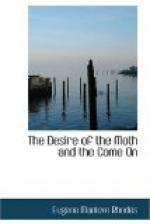“You were not always so thoughtful of the best interests of the dear pee-pul,” sneered the sheriff.
“That I wasn’t. I was as silly and hot-brained a fool as either side could boast. But you, Sheriff, are neither silly nor hot-headed. In cold blood you are planning that men shall die; that other men shall rot in prison. Why? For hate and revenge? Not even that. Oh, a little spice of revenge, perhaps; Foy and his friends made you something of a laughing stock. But your main motive is—money. And I don’t see why. You’ve got all the money any one man needs now.”
“I notice you get your share.”
“I hope so. But, even as a money-making proposition, your troubled-voters policy is a mistake. All the mountain men want is to be let alone, and you might be sheriff for life for all they care. But you fan up every little bicker into a lawsuit—don’t I know? Just for the mileage—ten cents a mile each way in a county that’s jam full of miles from one edge to the other; ten cents a mile each way for each and every arrest and subpoena. You drag them to court twice a year—the farmer at seed time and harvest, the cowman from the spring and fall round-ups. It hurts, it cripples them, they ride thirty miles to vote against you; it costs you all the extra mileage money to offset their votes. As a final folly, you purpose deliberately to stir up the old factions. What was it Napoleon said? ’It is worse than a crime: it is a blunder.’ I’ll tell you now, not a Barela nor an Ascarate shall stir a foot in such a quarrel. If you want to bait Kit Foy, do it yourself—or set your city police on him.”
“I will.”
A faint tinge of color came to the clear olive of Anastacio’s cheek as he rose.
“But don’t promise my place to any of them, sheriff. I might hear of it.”
“Stranger,” said Ben Creagan, “you can’t play pool! I can’t—and I beat you four straight games. You better toddle your little trotters off to bed.” The words alone might have been mere playfulness; glance and tone made plain the purposed offense.
The after-supper crowd in the hotel barroom had suddenly slipped away, leaving Max Barkeep, three others, and John Wesley Pringle—the last not unnoting of nudge and whisper attending the exodus. Since that, Pringle had suffered, unprotesting, more gratuitous insults than he had met in all the rest of his stormy years. His curiosity was aroused; he played the stupid, unseeing, patient, and timid person he was so eminently not. Plainly these people desired his absence; and Pringle highly resolved to know why. He now blinked mildly.
“But I’m not sleepy a-tall,” he objected.
He tried and missed an easy shot; he chalked his cue with assiduous care.
“Here, you! Quit knockin’ those balls round!” bawled Max, the bartender. “What you think this is—a kindergarten?”
“Why, I paid for all the games I lost, didn’t I?” asked Pringle, much abashed.




